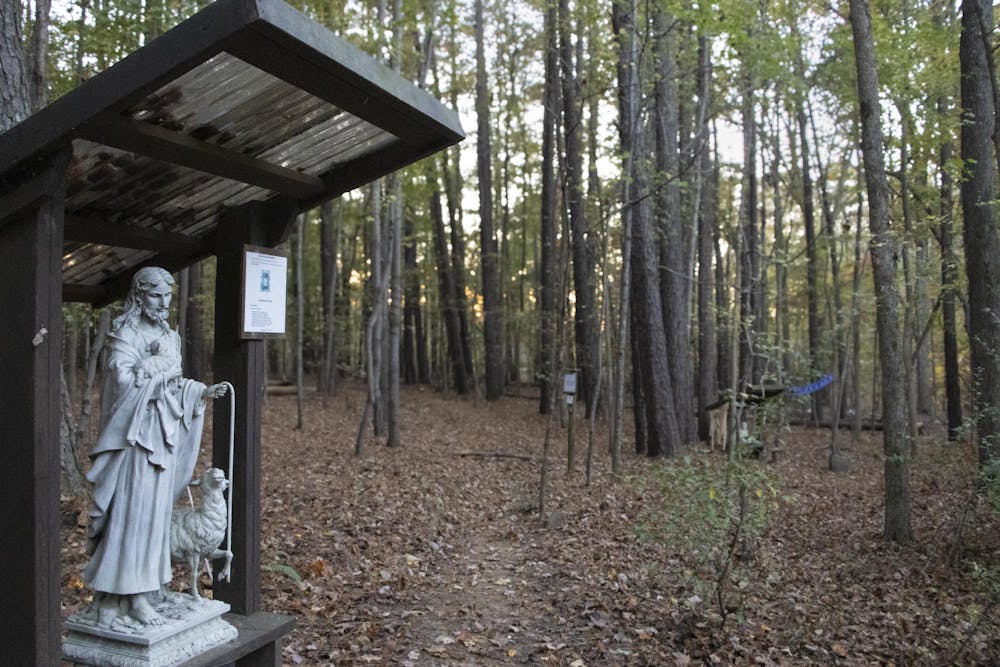The Unity Center for Peace is a Chapel Hill based organization that practices spirituality and works to empower people exploring diverse spiritual journeys. The center offers a physical place for people of all religious backgrounds to come together and practice their shared and unique beliefs.
“We’re very much inclusive,” Victoria Loveland-Coen, the senior minister at Unity, said. “I would call this universal spirituality. So we have Christians, Jews, Hindus, Buddhists, earth-based spirituality, atheists even, because we don’t have a dogma or any kind of religious beliefs that we recite. It’s mostly about recognizing and opening up to the spirit of the divine which is in each of us, to know it more fully, to see it in each other and to try and live from that place.”
The facility features a main building where Sunday services, classes, workshops and other events are held. A few examples of events offered by the Unity Center include a weekly meditation series, Sunday youth programs, Sivananda yoga and “Dances of Universal Peace,” a free, monthly event which brings people together through dance, song and story.
Outside the Unity Center is the Outdoor Sacred Spaces, a six-acre plot of land in the Carolina North Forest open from dawn till dusk to the public. The space has a Medicine Wheel, a Spiral Labyrinth and a Serenity Trail, and is intended for anyone who wishes to walk, meditate or practice spiritual rituals.
Medicine wheels have been used by Indigenous people for generations as a means of prayer, teaching, meditation and celebration. The design for the Unity Center's wheel is inspired by Sun Bear, the founder of the multi-racial medicine society called the Bear Tribe, formed in 1971. There are roughly 150 Indigenous Medicine Wheels in the United States and Canada, and artifacts reveal that these could date back 5,500 years.
The Wheel teaches about the cycles of life, represents ancestral connection and promotes the unity of all people. The Wheel has a combination of stones and planks scattered throughout it, some depicting zodiac signs, others depicting phrases like “attitudinal healing,” “gratitude” and “health.” The ritual associated with The Wheel requires that the participant place tobacco on the pillar representing their zodiac sign, and corn meal on the pillar representing a value that speaks to them while on their walk. This ritual also involves honoring the four directions — north, south, east and west — and reciting chants.
The labyrinth is a spiral of stones placed on the forest floor designed to mimic naturally occurring spirals that appear in nature on leaves, seashells and in the galaxy. The spiral shape is also derived from ancient Egyptian temples and Celtic monuments, and is believed to embody spiritual unity.
The labyrinth acts as a guided meditation. Participants walk counterclockwise until they reach the center, where the four directions are marked. One may meditate or pray to these directions, or simply stand in silence and receive the love and energy from the “Spirit.” When they finish this part of the ritual, they walk clockwise out of the labyrinth and re-enter the world strengthened and enlightened, according to the Unity Center website.
The Spiral Labyrinth and Medicine Wheel are connected by a Serenity Trail, which is intended to guide people to a greater connection with their inner selves, the world and the universal spirit. It features stations where participants can stop and read meditative instructions, as well as view statues of Master Teachers such as Jesus and Siddhartha Gautama, more commonly known as the Buddha.



